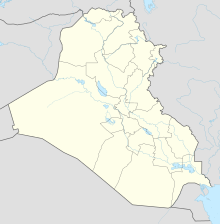Operation Granby
| Operation Granby | |
|---|---|
| Part of the Gulf War | |
 C Company, 1st Battalion The Staffordshire Regiment, in a live firing exercise, during Operation Granby, 6 January 1991. |
|
| Operational scope | Strategic offensive |
| Location |
Iraq, Kuwait, Saudi Arabia, Israel |
| Objective | Iraqi withdrawal from Kuwait; Emir Jaber III restored |
| Executed by |
|
Operation Granby was the name given to the British military operations during the 1991 Gulf War. 53,462 troops were deployed during the conflict. The total cost of operations was £2.434 billion (1992), of which at least £2.049 billion was paid for by other nations such as Kuwait and Saudi Arabia; £200 million of equipment was lost or written off.
Operation Granby took its name from John Manners, Marquess of Granby, a British commander in the Seven Years' War.
The Joint Commander Gulf Forces (based in the United Kingdom at RAF High Wycombe) was Air Chief Marshal Sir Patrick Hine 1 October 1990 – 31 March 1991, and Air Chief Marshal Sir Michael Graydon from 31 March 1991. His political adviser was Andrew Palmer. The Commander British Forces Middle East, the in-theatre commander (based in Riyadh), was initially Air Vice Marshal Andrew Wilson (September–October 1990), then Lieutenant-General Sir Peter de la Billière 6 October 1990 – March 1991, and Air Commodore Ian Macfadyen from March 1991.
The Air Commander British Forces Middle East (initially Arabian Peninsula) was Air Vice Marshal Andrew Wilson from August to 17 November 1990, then Air Vice Marshal William (Bill) Wratten from 17 November 1990.
The Senior British Naval Officer Middle East was Captain Anthony McEwen, Royal Navy until September 1990 (on HMS York), then Commodore Paul Haddocks from September to December 1990. Finally Commodore Christopher Craig, on HMS Brave and HMS London, was in command from 3 December 1990 to March 1991.
...
Wikipedia

